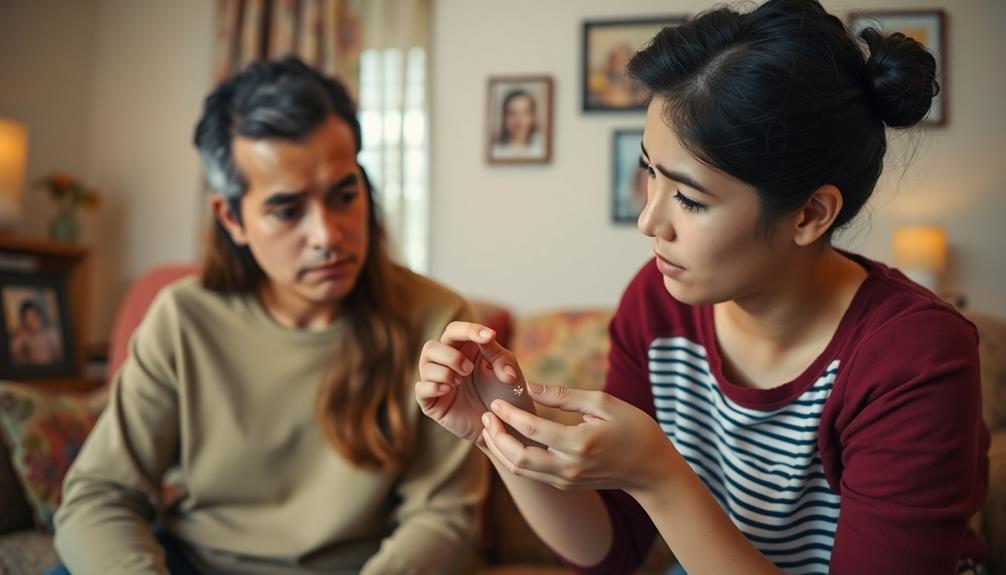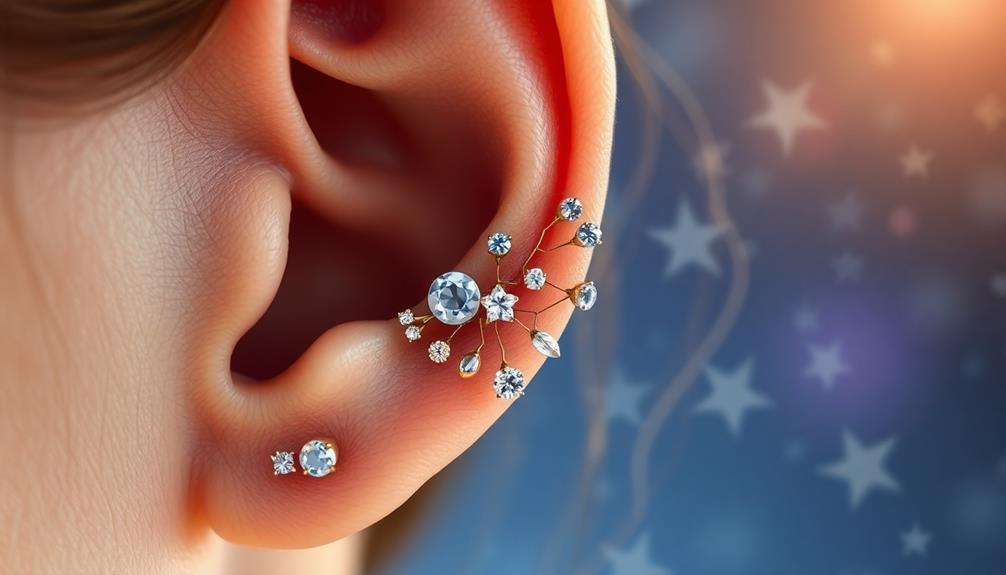To talk to your parents about getting a piercing, start by choosing the right time and setting for the discussion. Clearly express your reasons while showing you understand their concerns, like safety and aftercare. Do your homework on the piercing type, the healing process, and proper hygiene practices to demonstrate your responsibility. Be ready to listen to their views and suggest compromises, like starting with one piercing. Reinforce your emotional maturity by maintaining good grades and responsibilities. If you approach this conversation thoughtfully, you'll likely find common ground and agreement. Learn how to prepare even better strategies next.
Key Takeaways
- Acknowledge and address your parents' concerns about safety, health risks, and emotional readiness for a piercing.
- Research reputable piercing studios and aftercare practices to present informed choices to your parents.
- Demonstrate responsibility by proposing a financial plan and committing to daily aftercare routines.
- Choose a calm and appropriate time for the discussion, ensuring an open and respectful dialogue.
- Follow up on the initial conversation, maintaining responsibility and addressing any objections with clarity.
Understanding Parental Concerns

When you think about getting a piercing, it's important to understand your parents' concerns. They often have safety concerns, worrying about potential infections and the proper aftercare needed for healing. These worries stem from a genuine desire to protect your health and well-being.
Cultural or personal beliefs also shape their views on piercings. They might see body modifications as inappropriate or rebellious, which can lead to misunderstandings. It's crucial to acknowledge these perspectives when discussing your desire for a piercing.
Additionally, your parents consider your emotional readiness and maturity. They want to be sure you've thought this decision through and understand the responsibilities involved.
They may also discuss the financial side, including the cost of the piercing, jewelry, and aftercare products. This brings up important conversations about financial responsibility and whether you're ready to contribute.
Understanding that their concerns come from a place of care can help you communicate more effectively. By addressing their worries and showing you're prepared, you can create a more open dialogue about getting a piercing.
Researching Piercing Options

Before diving into discussions with your parents, it's essential to research your piercing options thoroughly. Start by exploring the most common types of piercings, like ear, nose, and belly-button, to find what suits your style. Understanding the healing process and aftercare for each option is significant, as some require more care than others.
| Piercing Type | Healing Process |
|---|---|
| Ear Piercing | 6-8 weeks |
| Nose Piercing | 2-4 months |
| Belly-Button Piercing | 6 months to 1 year |
Next, look for reputable piercing studios with at least a 4-star rating to guarantee they follow health and safety standards. This reduces the risk of infection, which is a common parental concern. Gather statistics about infections related to improper aftercare, as this can help address your parents' worries. Additionally, explore various jewelry materials, such as surgical steel or gold, which are less likely to cause allergic reactions. Presenting this information will strengthen your case and show that you're responsible about your piercing choice.
Preparing Your Argument

To prepare your argument, start by listing clear reasons for wanting a piercing that align with your parents' values, like self-expression and personal style.
Next, address their concerns by showing you've researched safety measures and aftercare for the specific piercing.
Reasons for Piercing
Many teens see piercings as an essential form of self-expression, allowing you to showcase your unique style and personality. This desire often peaks between ages 10 to 16, a time when self-awareness and the urge for personal expression are heightened.
Here are some compelling reasons to contemplate:
- Boosting Confidence: A piercing can enhance your aesthetics and complement your facial features, contributing to a more appealing appearance.
- Symbol of Personal Growth: For many, getting a piercing represents a rite of passage, marking maturity and personal development during adolescence.
- Demonstrating Responsibility: Committing to the care and aftercare of a piercing shows that you're responsible. Presenting a plan for daily cleaning and hygiene can further illustrate your readiness for this choice.
Incorporating these points into your discussion can help convey that a piercing isn't just a trend—it's a meaningful decision tied to self-expression, responsibility, and personal growth.
When you approach your parents with well-thought-out reasons, they may be more receptive to your desire for a piercing.
Addressing Parental Concerns
When discussing the possibility of getting a piercing, it's important to address your parents' concerns head-on.
Begin by acknowledging their worries about health risks. Share research that shows proper aftercare can greatly reduce infection rates and complications. Emphasize that reputable piercing studios follow strict safety measures, like sterilizing their equipment and using high-quality materials such as surgical-grade stainless steel or titanium.
Next, demonstrate your aftercare knowledge. Explain that you'll commit to a daily cleaning routine for at least six weeks post-piercing. This shows responsibility and dedication to keeping the piercing healthy.
Don't forget to tackle any financial concerns. Propose a plan to contribute to the cost by saving money from chores or allowances. This not only shows maturity but also your willingness to invest in this decision.
Demonstrating Responsibility
While you might feel excited about getting a piercing, showing your parents that you're responsible enough for this decision is essential. To demonstrate your commitment and readiness, consider the following strategies:
- Financial Responsibility: Offer to cover part or all of the piercing costs using savings from chores or your allowance. This shows maturity and an understanding of financial commitments.
- Proven Reliability: Consistently complete your daily chores and engage in family activities. This will illustrate your reliability and commitment to responsibilities at home.
- Setting Goals: Establish specific goals for school performance or extracurricular activities. When you achieve these goals, present them as incentives for earning the piercing.
Additionally, research proper aftercare routines and hygiene practices. Presenting this information reassures your parents that you understand the responsibility that comes with a piercing.
Sharing examples of how you've successfully managed personal projects or commitments can further convince them of your readiness. By taking these steps, you'll not only show your parents that you're serious about this decision, but you'll also demonstrate the responsibility necessary to maintain it.
Choosing the Right Time

Finding the right moment to discuss your piercing can greatly impact your parents' response. Start by choosing the right time—opt for a weekend afternoon or after a family meal when they're relaxed and free from distractions. This approach guarantees they're more receptive to your request.
Avoid initiating the conversation during stressful periods, like busy workweeks or when they're facing personal issues, as this could lead to a negative reaction.
Before broaching the subject, engage in light conversation or share recent positive experiences to create a comfortable atmosphere. This helps ease into the topic and sets a positive tone. You might also consider scheduling a specific time for the discussion. This allows your parents to mentally prepare and shows your seriousness about the matter.
Additionally, use moments of shared success, like good grades or completing chores, to reinforce your maturity. By establishing credibility and demonstrating responsibility beforehand, you'll make it easier for your parents to see your request in a favorable light.
Engaging in Open Dialogue

Engaging in open dialogue is essential for having a productive conversation about getting a piercing. Choosing a calm time with minimal distractions helps set the stage for a respectful exchange.
Begin by clearly sharing your reasons for wanting the piercing, emphasizing personal expression and maturity.
To foster a constructive atmosphere, consider these points:
- Actively listen to your parents' concerns, showing that you value their perspectives.
- Frame the conversation as a two-way exchange, inviting them to share their thoughts on piercings.
- Maintain respect throughout, acknowledging their views while presenting your own respectfully.
This approach not only demonstrates maturity but also builds rapport.
Be prepared to accept their opinions, showing that you're open to exploring compromises if necessary.
By engaging in this respectful conversation, you create a foundation of understanding, making it easier to address concerns while working towards a decision that satisfies everyone involved.
Remember, it's not just about getting your way; it's about fostering a relationship based on mutual respect and understanding.
This dialogue can pave the way for future discussions on topics that matter to both you and your parents.
Addressing Safety and Aftercare

Safety and aftercare are essential aspects to take into account when discussing a new piercing with your parents. You should explain that proper aftercare is imperative to prevent infections, which can occur in about 1-3% of piercings. Emphasizing that you'll clean the area with saline solution or gentle soap twice daily for at least six weeks shows your commitment to safety.
Mention that using gold or surgical stainless steel jewelry is important, as these materials are less likely to cause allergic reactions and reduce infection risks. Let them know you understand the importance of not touching the piercing with dirty hands and avoiding swimming in pools, lakes, or hot tubs for at least a month.
It's also essential to discuss the healing process; most ear piercings take about 6-8 weeks to heal, while cartilage piercings can take several months. Highlighting this knowledge demonstrates your seriousness about aftercare and minimizing risks.
Demonstrating Responsibility

Showing your parents that you're responsible can greatly strengthen your case for getting a piercing. Start by illustrating responsibility in your daily life. You can do this by completing chores without reminders and actively participating in family activities. This showcases your maturity and reliability.
To further bolster your argument, consider the following points:
- Financial Responsibility: Offer to save a portion of your allowance or earnings from a part-time job to cover the costs of the piercing. This shows commitment and understanding of the financial implications.
- Academic and Extracurricular Goals: Set specific goals for your academic performance and extracurricular activities. This illustrates that you can balance responsibilities with personal desires, reinforcing your ability to manage a new piercing.
- Knowledge of Aftercare Practices: Engage in discussions about aftercare practices with your parents. Show them that you're prepared to handle the responsibilities of maintaining your piercing, which includes proper cleaning and care.
Following Up on the Discussion

Following up on the discussion about getting a piercing is essential for demonstrating your maturity and commitment. After your initial conversation, give your parents a few weeks to reflect. This shows respect for their decision.
During this time, continue to demonstrate responsibility in your daily life—keep up with your grades, complete your chores, and show them you can handle more independence.
When you feel the moment is right, maintain open communication. Casually mention your ongoing interest in piercings, sharing any new research or insights you've gathered.
If they initially said no, politely ask them to clarify their reasons. Addressing their concerns in future discussions shows understanding and maturity.
You might also consider proposing a compromise, like suggesting a trial period for one piercing. This allows your parents to see your commitment to responsibility and proper aftercare.
Frequently Asked Questions
How Do You Tell Your Parents You Want a Piercing?
You find a calm moment, express your feelings clearly, and share your reasons. Show them you've researched safety and aftercare. Listen to their concerns, and be respectful, ready to discuss compromises if needed.
What Is the Right Age to Get a Piercing?
So, you think age defines wisdom? Well, around 12 usually works. It's less about numbers and more about maturity. Can you handle aftercare? If yes, maybe you're ready to rock that piercing!
How to Convince Parents to Let You Get More Piercings?
To convince your parents about more piercings, show responsibility by sharing your research on safety and hygiene. Offer to help with costs and suggest starting with one, demonstrating your commitment to aftercare and communication.
Can My Parent Written Consent for Me to Get Piercing?
Did you know that 30% of teens get piercings with parental consent? Yes, your parent's written consent is often required for you to get a piercing, ensuring they understand the procedure and its aftercare.
Conclusion
In the end, talking to your parents about a piercing isn't just about getting permission; it's about building trust, showing responsibility, and fostering understanding. By addressing their concerns, presenting your research, and demonstrating maturity, you can create a dialogue that respects both your desires and their worries. Remember, it's not just a conversation; it's a chance to strengthen your relationship, showcase your growth, and prove you're ready for this new step in your self-expression.
















